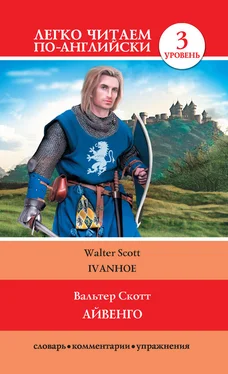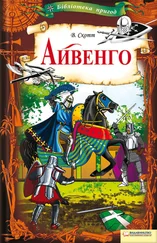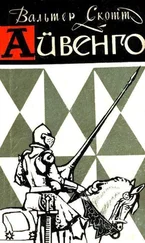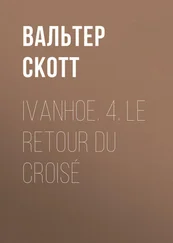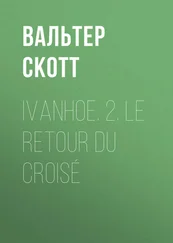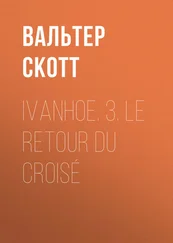So saying, he seized the terrified maiden and carried her out of the room in his arms in spite of her cries.
A few seconds later the Black Knight entered the same room and carried Ivanhoe away with as much ease as the Templar had carried off Rebecca. He brought him to the barbican and ran back to save the other prisoners.
When their guards ran away, Wamba and Athelstane went into the court of the castle, which was now the last scene of battle. Here the Templar on his horse and the remaining soldiers of the garrison fought very bravely. Rebecca, placed on the horse of one of the Templar’s Saracen slaves, was in the middle of the little party; and Bois-Guilbert showed every attention to her safety.
Athelstane, who was slow, but not a coward, saw a woman whom the Templar was protecting and decided that it was Rowena, whom the knight was going to carry off. Athelstan took an axe from the floor and ran to attack the Templar. But Bois-Guilbert rose in his stirrups and hit so hard with his sword, that he cut the wooden part of the axe in two and Athelstane fell on the floor. The Templar then pushed across the drawbridge with his Saracens and five or six soldiers on horses.
During that final stage of battle Ulrica appeared on a turret, her long grey hair flew back from her uncovered head and amid that scene of fire and of slaughter she began to sing a barbarous hymn. The fire rose to the evening skies. Tower after tower crashed down, and Ulrica disappeared in the flames.
* * *
In the morning the attackers met in the forest to divide the treasure they took from the castle. Locksley sat on his throne made of earth under the huge oak. He asked the Black Knight to sit at his right hand, and Cedric at his left.
“Forgive my freedom, noble sirs,” said Locksley, “but in this forest I am the King.”
“Noble Cedric,” he continued; “half of this treasure belongs to you and your people.”
“Good yeoman,” said Cedric, “I am rich enough to reward them myself and I waited until now only to give my thanks to you and to your bold yeomen.”
“And to you,” said Cedric, turning about and hugging his Jester, “How can I reward you?”
“I ask you,” said the Jester, “to forgive my friend Gurth, who stole a week from your service only to serve your son.”
“Forgive him?” exclaimed Cedric; “I will both forgive and reward him. – Kneel down, Gurth. You are now a free man, not a slave, and I will give you a piece of land.”

No longer a slave, but a freeman and a landowner, Gurth stood on his feet, and twice jumped aloft to almost his own height from the ground.
“I only have to say,” said Cedric, “that, during the funeral rites of the noble Athelstane, I will stay in his castle of Coningsburgh and it will be open to all who choose to come.”
“Brave knight,” said Locksley to the Black Champion, “what will you take from the treasure?”
“I ask permission,” said the Knight, “to deal with Sir Maurice de Bracy the way I like.”
“He is yours,” said Locksley, “and it is well for him!”
“De Bracy,” said the Knight, “you are free—leave. But beware in the future, Maurice de Bracy, beware!”
De Bracy bowed low in silence, caught a horse and disappeared in the forest.
Then Locksley took from his neck the rich horn and baldric which he had recently won at the tournament and said, “Noble knight, keep this horn as a memorial and if at some point you need help somewhere in this forests, you will only need to blow it three times.”
Locksley then distributed the treasure. A tenth part of the whole was set apart for the church; a portion was put in a sort of public treasury; a part was given to the widows and children of those who had died in battle. The rest was divided among the bandits. The Black Knight was surprised to find that men who lived without law had such good order among them.
The portion given to the church still lay there.
At this moment the Friar appeared.
“Make room, my merry-men!” he exclaimed; “room for your godly father and his prisoner,”—And making his way through the ring, amid the laughter of all around, he appeared in majestic triumph, his huge partisan in one hand, and in the other a rope, one end of which was fastened to the neck of the unfortunate Isaac of York. The priest shouted, “Where is Allan-a-Dale, to chronicle me in a ballad?”
“For the love of God!” cried the poor Jew, “will no one save me from this mad—I mean this holy man?”
“Think about your ransom, Jew” said the Captain, “while I examine a prisoner of another sort. Here he comes.” At that moment two bandits brought before their captain Prior Aymer of Jorvaulx.
* * *
The Abbot’s face showed a curious mixture of offended pride and terror.
“Are you Christians,” said the Prior, “and treat a churchman in this way?”
“Unfortunately, reverend father,” said Locksley, “I know only one way in which you can escape our company. Pay us a ransom.”
“What ransom should I pay for walking on the road without fifty men behind my back?”
“Wouldn’t it be good,” said one of the bandits, “if the Prior named the Jew’s ransom, and the Jew named the Prior’s?”
“This is a brilliant idea!” said the Captain, “Here, Jew, step forward, look at that holy Father Aymer, Prior of the rich Abbey of Jorvaulx, and tell us what ransom we should demand from him? – I believe you know the income of his monastery.”
“O, yes,” said Isaac. “I have bought many things from the good fathers of Jorvaulx. It is a rich abbey.”
“Dog of a Jew!” exclaimed the Prior, “no one knows better than you, that our holy house of God is in debt for the finishing of our altar—”
“And for buying many bottles of Gascon wine,” interrupted the Jew; “but that—that is all small.”
“Isaac,” said the leader, “pronounce what he can pay.”
“Six hundred crowns,” said Isaac, “the good Prior can well pay to you.”
“Six hundred crowns,” said the leader, gravely; “you have well spoken, Isaac—six hundred crowns. – It is a sentence, Sir Prior.”
“A sentence! – a sentence!” exclaimed the band.
“We will keep you here,” said the Captain, “and send your followers to bring your ransom.”
“Or, if you like this,” said Isaac, “I can send to York for the six hundred crowns, if the most reverend Prior gives me a document that he will pay me back.”
“He will write whatever you say, Isaac,” said the Captain, “and you will pay for yourself and for Prior Aymer.”
“For myself!” said the Jew, “I am a broken and impoverished man.”
“The Prior will be your judge,” replied the Captain. “What do you say, Father Aymer? Can the Jew afford a good ransom?”
“Can he afford a ransom?” answered the Prior. “Is he not Isaac of York? I tell you openly that he should pay one thousand crowns.”
“A sentence! – a sentence!” exclaimed the robbers.
“The God of my fathers help me!” said the Jew; “will you make me a beggar? – Is it not enough that I have lost my child today? O Rebecca! If each leaf on that tree were a coin, all that money I would give to know that you are alive!”
“Was not your daughter dark-haired and in an Eastern dress?” said one of the robbers.
“She was!” said the old man, trembling. “What can you tell me about her?”
“She was carried off by the proud Templar, when he broke through our band yesterday,” said the yeoman.
Читать дальше
Конец ознакомительного отрывка
Купить книгу
